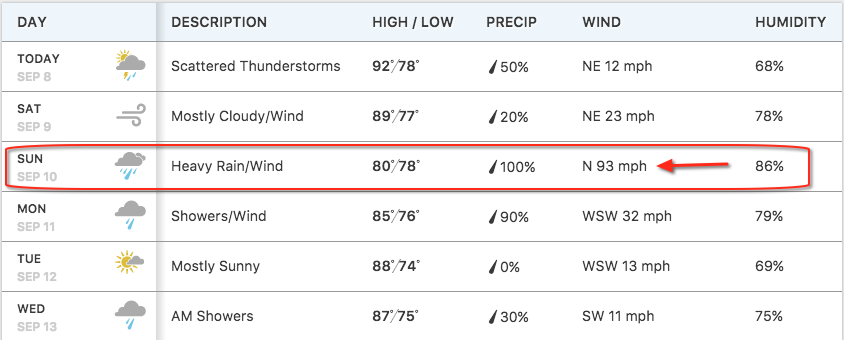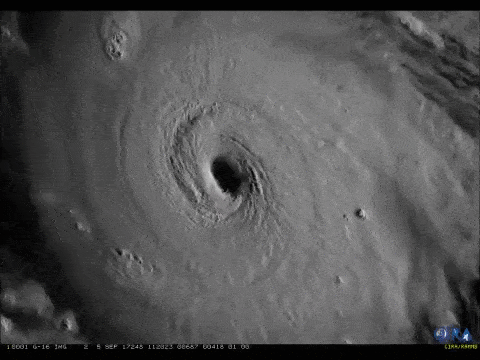Down here in Florida, we live in a seasonal threat of hurricanes. If you have been watching the news, you may have seen that there is a particularly large one heading this way as I write this. You would expect people living in Florida to know how to handle a storm, but as the years go by without a direct hit, people forget what to do when a storm is bearing down on them.
Assess the Situation
 The first thing you should do when a disaster is looming is to assess the situation. You need to take all your knowledge, and all the reports and put them together to come up with a realistic outlook on what will happen. In the case of hurricane Irma, the news is blowing things way out of proportion. Why would they do that? because fear makes people watch, and more people watching means more ad revenue. They will claim that it is better to be safe then sorry, and while there is truth to that, it is also better put your effort where it needs to go, and not into panic decisions. While the news like to remind everyone that this is a category 5 storm with 185 mph winds, they seem to be leaving out that it will weaken when it makes landfall, and is only expected to have 93 mph winds when it passes where I am (that would be category 1 force). Now don’t get me wrong, 93 mph winds are nothing to laugh at, but the reality is the situation isn’t have as bad as others are making it out to be.
The first thing you should do when a disaster is looming is to assess the situation. You need to take all your knowledge, and all the reports and put them together to come up with a realistic outlook on what will happen. In the case of hurricane Irma, the news is blowing things way out of proportion. Why would they do that? because fear makes people watch, and more people watching means more ad revenue. They will claim that it is better to be safe then sorry, and while there is truth to that, it is also better put your effort where it needs to go, and not into panic decisions. While the news like to remind everyone that this is a category 5 storm with 185 mph winds, they seem to be leaving out that it will weaken when it makes landfall, and is only expected to have 93 mph winds when it passes where I am (that would be category 1 force). Now don’t get me wrong, 93 mph winds are nothing to laugh at, but the reality is the situation isn’t have as bad as others are making it out to be.
You will see this same thing when a disaster strike your workplace. Someone will always panic and make things seem far worse then they are. Don’t fall into the panic mode. Instead, get the facts, and make a plan of action that fits the real scale of the situation.
Devise a Plan of Action
 Do you need to evacuate for a category 1 storm? Maybe. But only if you live someplace that is at extreme risk. If you have built a solid foundation, and a solid building (company), then you can likely ride out the issue if you plan properly. Whether the coming storm is a literal storm, or a disaster at work, what you need to do is examine all possible problems that are likely to arise as a result of the storm, and have a plan of action to deal with those problems if they arise. If you are on high ground, then maybe you shouldn’t waste your time planning for flooding. Instead, plan for a power outage because that is a more likely scenario. Do you have a backup generator? does it have fuel? When facing a disaster, plan for scenarios you may actually face, and don’t waste your time planning for things that will not happen.
Do you need to evacuate for a category 1 storm? Maybe. But only if you live someplace that is at extreme risk. If you have built a solid foundation, and a solid building (company), then you can likely ride out the issue if you plan properly. Whether the coming storm is a literal storm, or a disaster at work, what you need to do is examine all possible problems that are likely to arise as a result of the storm, and have a plan of action to deal with those problems if they arise. If you are on high ground, then maybe you shouldn’t waste your time planning for flooding. Instead, plan for a power outage because that is a more likely scenario. Do you have a backup generator? does it have fuel? When facing a disaster, plan for scenarios you may actually face, and don’t waste your time planning for things that will not happen.
Don’t Panic
Everyone seems to panic when faced with a coming storm (whether it is a literal one, or not). But you are smart, you have health with this sort of thing before, and you know what to do. So don’t panic. Put that knowledge and experience to work to ride out the storm and emerge out the other end in one piece.
